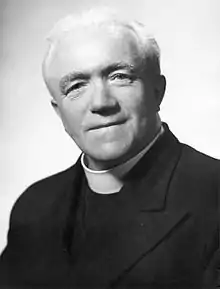Moses Ayrton
Moses Ayrton (15 July 1878 – 3 October 1950) was a New Zealand Methodist minister and socialist.
Moses Ayrton | |
|---|---|
 | |
| 3rd Secretary of the Labour Party | |
| In office 1920–1922 | |
| Leader | Harry Holland |
| Preceded by | Michael Joseph Savage |
| Succeeded by | Walter Nash |
| Personal details | |
| Born | 15 July 1878 Yeadon, Yorkshire, England |
| Died | 3 October 1950 Wellington, New Zealand |
| Political party | Labour Party |
| Other political affiliations | Social Democratic |
| Spouse(s) | Ethel Firth (m. 1900 d. 1939) Grace Pinfold (m. 1948) |
| Children | 5 |
| Profession | Clergyman |
Biography
Early life
He was born in Yeadon, Yorkshire, England on 15 July 1878.[1] His parents were Moses Airton, who was a woolen waste dealer, and his wife Martha Chappell. Ayrton worked through his youth as a grocer's assistant and also became a Wesleyan Methodist lay reader. He also became politically minded and joined the Independent Labour Party which reflected his Christian beliefs, compassion and social conscience.[1] When he was 18 he was ordained as a member of the Methodist clergy. On 6 November 1900 he married his first wife Ethel Firth at Rawdon, Yorkshire.[1] Ayrton emigrated to New Zealand in 1908 and from 1910 to 1919 served as a missionary in North Taranaki, Tauranga, Greymouth, Runanga, Denniston. During his time in Tauranga Ethel and their three children arrived in New Zealand. The Ayrtons had two additional children in New Zealand.[1]
Political involvement
Whilst in Runanga Ayrton was elected to the Runanga Borough Council and the Grey Hospital Board as a Labour member.[2] During this period he was also a nominator of Paddy Webb's for candidacy in the 1913 Grey by-election and was to serve as Webb's campaign chairman.[1] Ayrton was a member of the local Social Democratic Party executive and would represent it at national conferences. He would later serve as the party's vice president in from 1915 to 1916.[2]
He was an unsuccessful Labour Party candidate in the Palmerston electorate in the 1919 election where he came runner up.[3] He later served as the Labour Party's secretary from 1920 until 1922.[4]
Later life and death
Ayrton retired from the church in 1945, but still continued to perform some ministerial duties. His first wife Ethel died on 23 October 1939. Ayrton married Grace Pinfold (née Darling), at Wellington on 10 June 1948. After some years of poor health he died at Wellington on 3 October 1950. He was survived by his second wife Grace and his children.[1]
Notes
- Brown, Colin. "Moses Ayrton". Dictionary of New Zealand Biography. Ministry for Culture and Heritage. Retrieved 10 February 2012.
- Gustafson 1980, p. 153.
- Hislop, J. (1921). The General Election, 1919. National Library. pp. 1–6. Retrieved 6 December 2014.
- Paul 1946, p. 192.
References
- Gustafson, Barry (1980). Labour's path to political independence: The Origins and Establishment of the New Zealand Labour Party, 1900–19. Auckland, New Zealand: Auckland University Press. ISBN 0-19-647986-X.
- Paul, J. T. (1946). Humanism in Politics: New Zealand Labour Party in Retrospect. Wellington: New Zealand Worker Printing and Publishing.
| Party political offices | ||
|---|---|---|
| Preceded by Michael Joseph Savage |
Secretary of the Labour Party 1920–1922 |
Succeeded by Walter Nash |
| Preceded by Frederick Cooke |
Vice-President of the Social Democratic Party 1915–1916 |
Party disestablished |